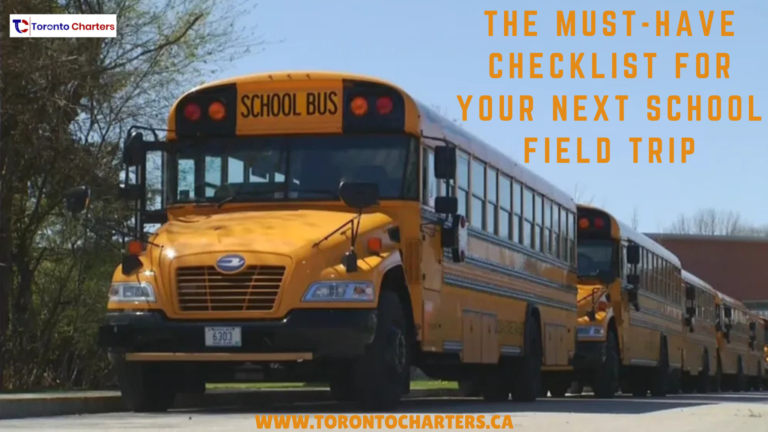Planning a school field trip requires much consideration. Safety, organization, and ensuring that students gain the most from the experience all require advanced planning by the organizers.
An organized checklist will keep you on the straight road without last-minute stress. Whether you are using Toronto School Bus Chartersor any other mode of transportation, proper arrangements will ensure a smooth and successful journey.
School Field Trip Checklist
1. Get Permissions and Paperwork in Order
Before anything else, confirm that you have the necessary approvals. Schools often require specific forms to be completed before a trip can take place. Make sure you have:
- Permission slips signed by parents or guardians
- Emergency contact details for each student
- Any medical forms for students with allergies or health conditions
- Approval from school administrators
- Transportation forms and liability waivers
2. Choose the Right Location
The destination should be educational, engaging, and appropriate for the age group. Consider:
- How the trip connects to classroom learning
- Safety and accessibility of the venue
- Costs, including entrance fees and meals
- Travel time and distance
Call ahead to confirm availability, group pricing, and any special requirements. If needed, arrange Toronto Bus Charters to ensure a hassle-free journey.
3. Arrange Transportation
Once the location is set, figure out how you’re getting there. Options might include school buses, Coach Bus Charter Toronto, or public transportation. Keep in mind:
- Booking the transportation well in advance
- Verifying insurance and safety guidelines
- Making sure there’s enough seating for students and chaperones
- Creating a backup plan in case of delays or cancellations
4. Plan the Itinerary
A structured itinerary keeps everything running smoothly. Outline:
- Departure and return times
- Check-in points throughout the day
- Time allocated for activities, meals, and breaks
- Emergency meeting locations
- Contact details for venue staff
Print copies for all teachers and chaperones, and provide a digital version if possible.
5. Organize Chaperones and Assign Roles
Chaperones help manage the students and ensure safety. Assign roles in advance so each one of you knows your responsibilities. Make sure:
- You have enough adults to maintain supervision ratios
- Each chaperone has a list of students they are responsible for
- All adults understand the rules and emergency procedures
- Teachers and chaperones carry a copy of the itinerary
6. Prepare for Emergencies
Safety is the top priority on any field trip. Be ready for unexpected situations by having:
- A fully stocked first-aid kit
- Emergency contact list, including local authorities
- A plan for lost students
- Copies of student medical information
- Extra medications for students who need them
Make sure everyone knows the emergency meeting point and procedure. Having a reliable Charter Bus Service can also add extra convenience and safety.
7. Pack Necessary Supplies
Bring everything you might need for a full day away from school. This may include:
- Printed name tags for students and staff
- Extra water bottles
- Snacks, if permitted
- Maps and guidebooks
- Hand sanitizer and disinfecting wipes
- Activity materials, if students will be working on assignments
8. Set Clear Rules and Expectations
Students should understand what’s expected of them before the trip starts. Discuss:
- Appropriate behavior and consequences for breaking rules
- Staying with the group at all times
- Respecting chaperones and staff at the venue
- What to do in case they get separated from the group
- Any restrictions on phone use or personal belongings
9. Plan Meals and Snacks
Food arrangements depend on the trip location. If meals are not provided, check with parents about any dietary restrictions and allergies. You can:
- Arrange packed lunches from the school
- Confirm if students should bring their own lunch
- Check if the venue offers food options
- Carry extra snacks for emergencies
When traveling long distances, choosing Toronto School Bus Charters that allow easy meal breaks can be beneficial.
10. Ensure Learning Opportunities
A field trip should be more than just a fun day out. Prepare ways to make the experience educational:
- Assign small research projects before the trip
- Have students take notes or complete worksheets
- Plan discussions or reflection activities after the trip
- Let students to ask questions and interact with guides
11. Confirm the Weather and Dress Code
Check the forecast a few days before the trip and advise students accordingly. Remind them to:
- Wear comfortable shoes for walking
- Dress in layers for unpredictable weather
- Bring raincoats or umbrellas if needed
- Wear hats and sunscreen for outdoor trips
12. Organize Student Groupings
Assign students to smaller groups with designated chaperones. This helps with:
- Easier headcounts
- Better behavior management
- Keeping students engaged in activities
- Allowing chaperones to give more individual attention
Having a structured system in place makes it easier for Toronto Bus Charters to manage boarding and seating arrangements efficiently.
13. Prepare a Budget Breakdown
Make sure all costs are accounted for, including:
- Transportation fees
- Entry tickets
- Meals and snacks
- Emergency funds for unexpected expenses
Keep receipts and track spending to stay within budget. Choosing cost-effective options like Coach Bus Charter Toronto can help manage expenses efficiently.
14. Communicate with Parents
Keeping parents informed helps avoid confusion. Send out:
- Detailed trip itineraries
- Packing lists
- Emergency contact information
- Pick-up and drop-off times
- Any last-minute changes or reminders
15. Conduct a Final Check
The day before the trip, go over the checklist one more time. Confirm:
- All paperwork is complete
- Transportation is arranged
- First-aid supplies are packed
- Chaperones know their responsibilities
- Students understand the rules
- Emergency contacts are accessible
Having a dependable Charter Bus Service ensures peace of mind when it comes to logistics.
After the Trip: Reflection and Feedback
Once the trip is over, gather feedback from students, teachers, and chaperones. Discuss:
- What went well
- What could be improved for next time
- Any unexpected challenges
- How students benefited from the experience
Have students share what they learned through class discussions or written reflections. If the transportation service was reliable, consider using Toronto School Bus Charters for future trips.
At the End!
Proper preparation is necessary for a successful school field trip, but the correct checklist will allow everything to go on seamlessly. Covering all the essentials of safety, organization, and learning value makes the whole experience of a great meaning to the students. From trusted services such as Coach Bus Charter Toronto, the next trip will be a stress-free, rewarding event for all concerned.


